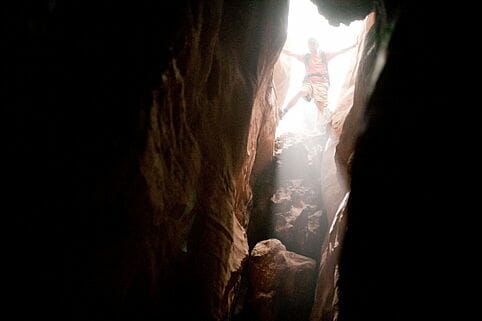By Patrick Kirkland · February 1, 2011

I have been writhing in agony for two days. Stuck, with one single image in my mind, and I have to pause and take a breath every time I think about it because it might just be the single most striking image in film this year.
Yes, more striking than Jeff Bridges calling his shot in True Grit. Yes, way more striking than your favorite toys coming together, holding hands in celebration of friendship on the way to their deaths. And yes, more striking than the feathers encompassing a mentally ill ballerina.
Roughly 100 minutes into 127 Hours, Aron Ralston digs into his mutilated arm with a dull knife, pulls, and severs the nerve that runs down the length of his bone. And Holy Mother of God, I shuttered in pain watching, as did the entire theater.
Just thinking about it, I have to cross my legs and wrap my arms around myself and tell myself it’s okay. I have to feel down my arm, just to make sure it’s still there. I have to remember that I’m not even a climber. I don’t own a car. I don’t jump out of airplanes. The most I do 90% of my time is sit in front of a computer and write. I walk the dogs. I sometimes like to take my camera around town. My life has just about every assurance that I won’t get into that situation. And maybe that’s why that damn montage hurts so damn much.
He cut the freaking nerve. Not only are we cheering this guy on while he purposefully breaks his arm in two places, unable to even comprehend the pain or intensity with which that took place. Not only are we forced to relate back to the media and attention that Ralston got when 1) He did it, and 2) He wrote a book about it, and not only are we forced to look back at him and wonder, “You know, if I were in that situation, would I do the same thing?” No, up until we see that, we – the audience – we’re fair game. We think, “Yeah, it’s life or death.” “Sure, it’s the only way out.” “Yeah, you should have done that 126 hours ago.” But then we see that nerve. And we see that dull knife. And we remember the last 100 minutes of watching him pluck away at that rock. We remember the scene where he can’t even cut his skin with the blade. And the diatribe about it being the free gift rings through our heads, and again that nerve, and we think, “Oh, HELL no.”
If it were me- if it were me… Well… That’s the question, isn’t it?
In every writing class, acting class, and filmmaking class across the globe, teachers are telling their students to “up the stakes.” The higher the stakes, the better and truer the moment. In every film, in the third act, the stakes have to be life or death.
But let’s be honest here – not every film is life or death. I mean, if Andy wouldn’t have broken out of Shawshank, he may be unfulfilled, but he wouldn’t be dead. If the kid in Slumdog didn’t find the girl, he wouldn’t be dead; he’d just be alone – and rich. And sure, if Frodo didn’t return the Ring, he’d be dead, but he’s Frodo. He’s a figment of imagination. You can kill a figment of imagination; people do it every day. You don’t even have to feel guilty about it.
But 127 Hours isn’t a figment. It’s a guy. It’s a place. It puts Castaway to shame in the pure fact that even if Tom Hanks never got off the island, he’d still be Tom Hanks. He’d be fat and happy and tan, learning how to make fish stew with coconuts and rocks. We’d be sad, but, really. It’s just Tom Hanks. And sure this is James Franco, but we’ve forgotten. We’ve already forgotten that this is just James Franco. He’s Aron. He’s natural. He’s casual. He’s likable. And this is real. This is true. The stakes here are truly life and death.
The balls of these guys. It takes some real nerve. And then they cut it. And by cutting it, they shot their way into the Oscars, and Franco into a whole new world of acting.